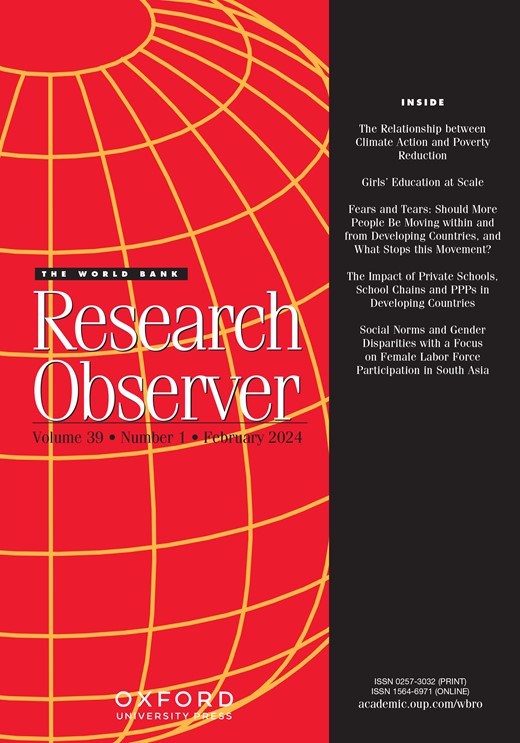评“评估发展成功的秘诀”:发展的制度和政治分析的政策效用
IF 3.3
1区 经济学
Q1 DEVELOPMENT STUDIES
引用次数: 3
摘要
在《评估发展成功的秘诀》一书中,阿维纳什·迪克西特批评了最近确定发展的“根本”原因并从这些努力中提炼出政策建议的努力。这篇评论的重点是与制度和发展有关的文献。有两个论点很重要:法治和产权保障对经济增长很重要,它们是政治制度的产物。迪克西特教授认为,识别和其他担忧削弱了第二个论点,并阻碍了政策建议的制定。虽然这些担忧是有效的,但研究已经开始分解广泛的政治制度(民主和专制),并研究政治竞争的细节,例如选民信息和政治家信誉,这些都是政治决策的更强大决定因素,也更容易受到政策干预的影响。版权所有作者2007。牛津大学出版社代表国际复兴开发银行/世界银行出版。版权所有。有关许可,请发送电子邮件:journals.permissions@oxfordjournals.org,牛津大学出版社。本文章由计算机程序翻译,如有差异,请以英文原文为准。
Comment on “Evaluating Recipes for Development Success”: The Policy Usefulness of Institutional and Political Analyses of Development
In "Evaluating Recipes for Development Success" Avinash Dixit criticizes recent efforts to identify the "fundamental" causes of development and to distill policy recommendations from these efforts. This comment focuses on the strand of that literature related to institutions and development. Two arguments are important: that the rule of law and the security of property rights are important for growth and that they are the product of political institutions. Professor Dixit argues that identification and other concerns undermine the second argument and inhibit the formulation of policy recommendations. While these concerns are valid, research has begun to disaggregate broad political institutions (democracy and autocracy) and to look at the details of political competition, such as voter information and politician credibility, which are both more robust determinants of political decision-making and more susceptible to policy interventions. Copyright The Author 2007. Published by Oxford University Press on behalf of the International Bank for Reconstruction and Development / the world bank . All rights reserved. For permissions, please e-mail: journals.permissions@oxfordjournals.org, Oxford University Press.
求助全文
通过发布文献求助,成功后即可免费获取论文全文。
去求助
来源期刊

World Bank Research Observer
Multiple-
CiteScore
12.60
自引率
1.20%
发文量
8
期刊介绍:
The World Bank Journals, including the Research Observer, boast the largest circulation among economics titles. The Research Observer is distributed freely to over 9,100 subscribers in non-OECD countries. Geared towards informing nonspecialist readers about research within and outside the Bank, it covers areas of economics relevant for development policy. Intended for policymakers, project officers, journalists, and educators, its surveys and overviews require only minimal background in economic analysis. Articles are not sent to referees but are assessed and approved by the Editorial Board, including distinguished economists from outside the Bank. The Observer has around 1,500 subscribers in OECD countries and nearly 10,000 subscribers in developing countries.
 求助内容:
求助内容: 应助结果提醒方式:
应助结果提醒方式:


